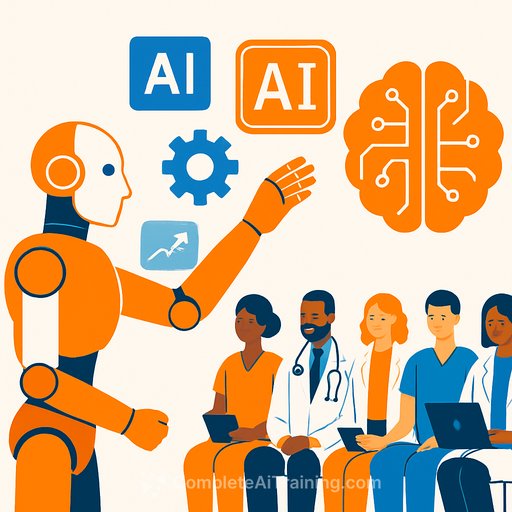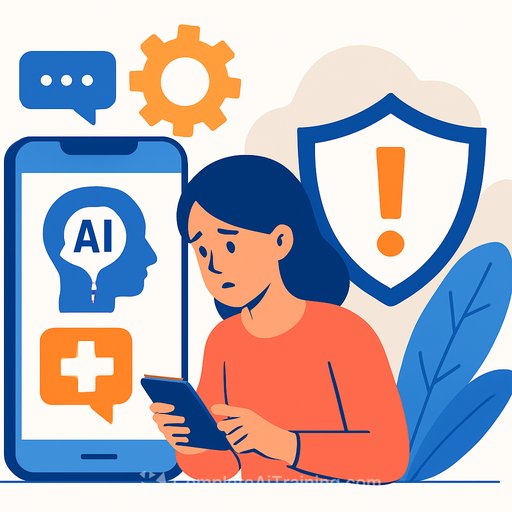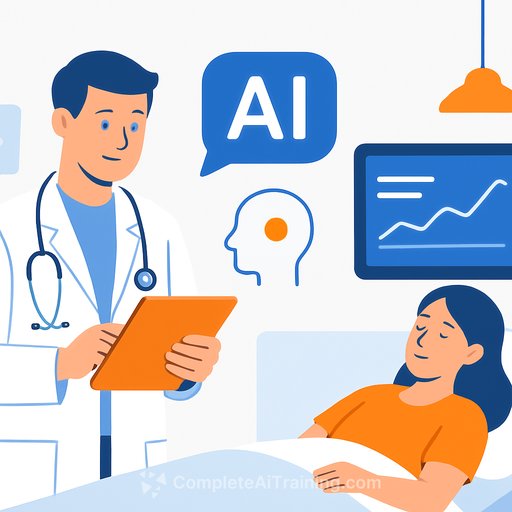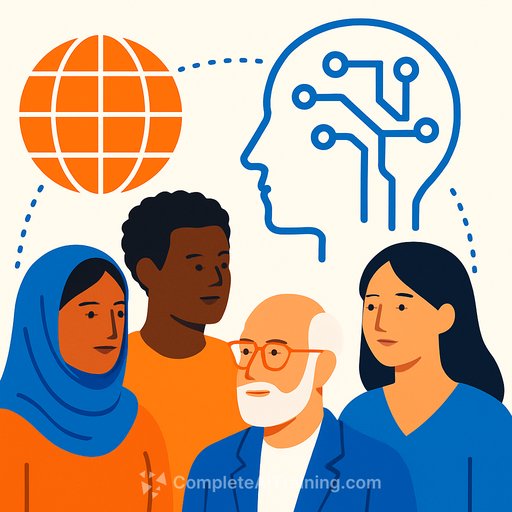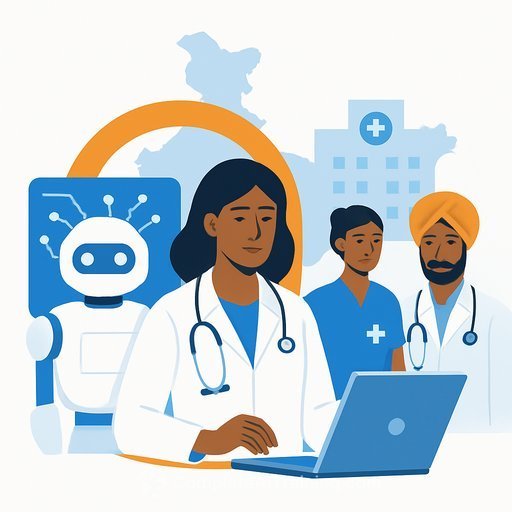Top 5 Healthcare Jobs in Atlanta Most at Risk from AI — And How to Adapt
TL;DR: In Atlanta’s healthcare sector, AI is poised to automate many routine roles like medical data entry, basic patient support, and administrative jobs—with up to 62% automation risk by 2044. However, AI also boosts nursing, diagnostics, and pharmacy roles, creating new opportunities. Upskilling in AI tools is essential for healthcare workers to protect their careers and improve patient care.
AI’s Impact on Healthcare Jobs in Atlanta
Healthcare roles across Georgia, especially in Metro Atlanta, are shifting as AI technologies automate routine tasks and support high-skill positions. A shortage of healthcare professionals persists, with 143 of 159 counties facing provider deficits and an estimated need for 8,000 more doctors by 2030. AI helps ease this pressure by taking over administrative work and enhancing diagnostic accuracy.
Experts warn, however, that biased AI data can worsen health disparities, particularly in communities of color. Successful AI adoption requires training healthcare workers to work effectively alongside AI, emphasizing ethics and equity. Educational programs focused on AI skills are key to preparing the workforce for these changes.
How We Identified the Most At-Risk Healthcare Jobs in Atlanta
The analysis combined national employment projections with local healthcare trends in Georgia. Roles with repetitive tasks—like administrative duties and basic diagnostics—face the highest automation risk. Atlanta healthcare providers increasingly use AI tools such as ambient listening devices and machine vision to improve workflow and reduce burnout.
The global AI healthcare market is expanding—from $39.25 billion in 2025 to an expected $504.17 billion by 2032—with North America leading growth. This growth drives innovation and adoption in Georgia. Our approach also considered regulatory factors and AI implementation strategies to provide practical advice for healthcare workers facing these shifts.
Nursing Workforce Changes: AI as a Support Tool
In nursing, AI is not replacing human care but augmenting it. AI tools enable continuous patient monitoring, early detection of health declines, and automated medication management. This lets nurses spend more time on complex care and empathy rather than routine tasks.
Clinical Decision Support Systems (CDSS) offer real-time guidance, boosting safety and outcomes. AI also streamlines documentation and scheduling, reducing burnout. Nursing programs in Atlanta, like those at Emory University, are now incorporating AI training to prepare nurses for these changes.
Success depends on nurses developing AI literacy while retaining critical thinking and empathy. AI helps reduce workload and improves mental health by handling repetitive tasks. Predictive analytics and wearable devices further personalize care, making AI a valuable nursing partner.
Medical Data Entry and Administrative Roles: AI Automates Routine Paperwork
Administrative roles in Atlanta’s healthcare are experiencing major changes as AI automates tasks like chart management, scheduling, and medical coding. Technologies such as Optical Character Recognition (OCR) and Natural Language Processing (NLP) improve accuracy and speed, cutting patient registration times and reducing costly errors.
AI systems can handle repetitive data entry, eliminate duplicates, and update electronic health records automatically. This frees staff to focus on more complex, patient-centered activities. Upskilling in AI system management is essential as these roles evolve.
For example, AI-driven medical coding has reduced claim errors by 55% and sped up processing by 72%, benefiting both providers and patients. Healthcare organizations across Georgia are adopting AI to improve efficiency and quality.
Basic Patient Support and Customer Service: The Rise of AI Chatbots
Basic patient support jobs in Atlanta are transforming through AI chatbots that offer 24/7 assistance. These bots manage routine inquiries, appointment scheduling, and send automated reminders that reduce no-show rates by about 30%.
Integrated with provider calendars and electronic records, chatbots optimize scheduling and fill cancellations quickly, boosting appointment utilization from 70–80% to over 90%. For staff, this reduces burnout by handling repetitive tasks and allows focus on complex patient interactions.
Patients enjoy instant communication across multiple channels, shorter wait times, and personalized care instructions, leading to higher satisfaction. Despite concerns around data privacy and digital access, AI chatbots are becoming essential tools in Atlanta’s healthcare administration.
Radiology and Diagnostic Imaging Technicians: AI as a Second Set of Eyes
AI enhances radiology and imaging roles by improving image quality, automating routine analyses, and detecting abnormalities earlier than traditional methods. For instance, AI can identify diseases like pancreatic cancer up to two years sooner, giving technicians and radiologists more time for complex diagnostics and patient interaction.
Rather than replacing these professionals, AI supports them by reducing tedious tasks and burnout. Radiology experts are encouraged to lead AI tool development to ensure these systems fit clinical workflows. Developing AI literacy and specialized training enhances career prospects in this field.
Pharmacy and Routine Lab Technicians: Automation Supports Clinical Focus
AI and robotics optimize specimen handling and medication dispensing in Atlanta’s pharmacies and labs. Automated systems improve accuracy, reduce errors, and manage inventory efficiently, predicting demand to prevent shortages.
These technologies free technicians to engage more in clinical tasks like medication therapy management and patient education. Human oversight remains crucial to ensure ethical decisions and compassionate care.
Pharmacy technicians in Atlanta are adapting by gaining advanced technical skills and certifications. AI allows them to shift from routine dispensing to more impactful clinical support roles, improving patient outcomes.
Conclusion: Adapt to AI to Stay Relevant in Healthcare
About 62% of healthcare jobs in metro Atlanta face medium to high automation risk in the next two decades, especially those centered on routine administrative and support tasks. However, roles requiring complex human judgment—like nursing and advanced diagnostics—are more secure.
AI offers benefits like better diagnostics and cost reductions but brings challenges such as bias and ethical concerns. Healthcare workers must prioritize learning AI skills and applying them responsibly. Training programs—such as those available at Complete AI Training—provide practical courses to build AI proficiency and transition into roles less vulnerable to automation.
Embracing AI as a tool rather than a replacement, and committing to continuous learning, will help healthcare professionals in Atlanta sustain and grow their careers while contributing to equitable, high-quality patient care.
Frequently Asked Questions
- Which healthcare jobs in Atlanta are most at risk from AI automation?
Roles like medical data entry, administrative positions, basic patient support, and routine tasks performed by pharmacy and lab technicians are at highest risk. These jobs involve repetitive tasks suited for automation by AI technologies such as natural language processing and robotic dispensing. - How is AI changing nursing roles in Atlanta's healthcare system?
AI enhances nursing by automating routine tasks like documentation and patient monitoring, allowing nurses to focus on complex, empathetic care. Nurses need to develop technical skills to work alongside AI while maintaining critical judgment. - What are the benefits and challenges of using AI chatbots in basic patient support roles?
AI chatbots reduce no-show rates, improve appointment scheduling, and ease staff workload, leading to higher patient satisfaction. Challenges include protecting data privacy and ensuring access for all patient groups. - How can healthcare professionals in Atlanta adapt to AI-driven changes in their jobs?
Professionals should upskill in AI tools and integrate AI insights with human expertise. Programs like those at Complete AI Training offer practical AI education to support this transition. - What role does AI play in radiology and diagnostic imaging technician jobs in Atlanta?
AI acts as a "second set of eyes," enhancing image analysis and early detection of abnormalities. It supports rather than replaces technicians, who need AI literacy to help shape effective clinical AI tools.
Your membership also unlocks:

